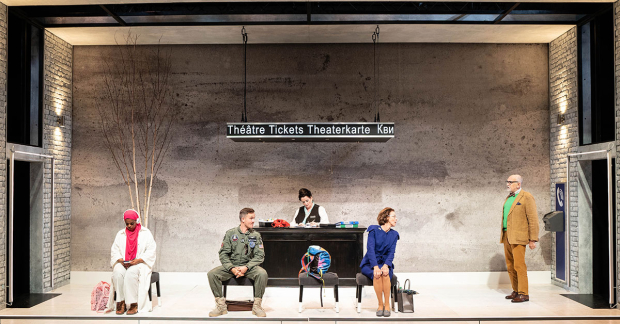”Exodus” / ”The Last Return” at the Traverse Theatre – Edinburgh Fringe review

Exodus
Four stars
The Last Return
Five stars
At a time when people say politics is both too serious and too ridiculous for satire, the Traverse Theatre in Edinburgh boldly marches in with two fiercely political and satirical plays which deal with the state of the world today.
The plot of Exodus, from the National Theatre of Scotland, has become almost too on the nose. Although writer Uma Nada-Rajah has been working on the piece since 2018, it is premiered at a time when its premise of a fictional Tory leadership candidate of colour seeking to succeed the Prime Minister with immigration policies of monstrous severity seems to be reflecting the headlines rather than sending them up.
In fact, Home Secretary Asiya Rao (a sparky Aryana Ramkhalawon) who poses on the White Cliffs of Dover while dressed up as Britannia, could be an amalgam of Liz Truss, Rishi Sunak and Priti Patel. And her plan – Project Womb – which will irradiate the waters around the British Isles to keep migrants out feels like an only slightly absurdist view of the real world. “There have been some minor hiccups with the fish. The British fish are, for the most part, delighted.”
But the savagery of its satire also owes a debt to the 18th century satirist Jonathan Swift and his Modest Proposal that the poor of Ireland should sell their babies to the rich for food.
There’s a baby here too, one who is swept up by the waves when Rao is posing for her photographs, and tucked – equally quickly – into her Hermes handbag by her Machiavellian aide Phoebe (Sophie Steer), a woman who will do literally anything to make her boss Prime Minister.
An acceleratingly farcical train journey follows, with director Debbie Hannon carefully orchestrating the mayhem on Alisa Kalyanova’s clever, colourful set, animated by Rob Willoughby’s videos. The madness and confusion of each scene, also involving a journalist (Anna Russell-Martin) out for her first big break and an asylum-seeking actress (Habiba Saleh) playing Rao’s mother, has a wild and whirring quality.
It is very funny, and quite crazed, but the callousness depicted is chilling too. Nada-Rajah’s point, strongly made, is that politicians are prepared time and time again to avoid human suffering – and even to cause it – if it serves their own interests.
The performances are all vigorous and committed, but the stand out is Steer’s calculating Spad, reeling from crisis to crisis while always pretending to be in control. At one point, she just stands frozen, trying to work out how to react. Her calm becomes the fixed point in the accelerating chaos.
Exodus is fun, but it doesn’t quite know when to stop. It feels slightly like being hit over the head repeatedly with a large rubber hammer. The Last Return, however, makes its points with the subtlety of a fencer, feigning a gentle advance, but stabbing you over and over again with a rapier.
This astonishingly original play by Sonya Kelly, for the Druid Theatre Company, starts from an innocuous premise. In a cool, theatre foyer, somewhere in the world, designed by Francis O’Connor to be both bland and international, and dominated by a ticket desk that announces its wares in four languages, a woman with an umbrella arrives to demand a ticket for Oppenheimer’s Return to Hindenberg.
The ticket seller calmly informs her that this, the final performance, is sold out, but if she cares to wait, any returns will be sold ten minutes before the show begins. Yet there is already a gentleman reading a newspaper, waiting for a ticket. The woman needs a ticket because seeing Oppenheimer has become the glue that is holding her office together. If she doesn’t see the piece, she will be denied promotion.
But the man is professor of Oppenheimer studies and, thanks to an incontinence problem, has been unable to see the work to its close, despite attending 36 times. His job too is under threat from machinations within his department. “So you see, tonight, my situation is very desperate. I simply cannot fail.” Gradually, these two, at war with each other over their place in the queue, are joined by others – a soldier (“I’m here on doctor’s orders) and a woman in pink who communicates via Google translate that she is just waiting for someone.
They must negotiate not only each other’s desires, but the rules of the queue – and the intransigence of the ticket seller who constantly repeats the same rubric. “I do not organise the ticket queue. It is up to the people in the ticket queue to organise themselves.”
The control of Kelly’s writing is dazzling. There are clues from the start that the world depicted is not quite what it seems; a piece written by someone with the name of the inventor of the atom bomb about either an airship disaster or the President of Germany who took his country into the First World War is clearly doing some metaphorical heavy lifting. So are the occasional explosions that shake the space; they might be the inclement weather or they could be something more sinister.
But each shift of mood in the descent into something other, is beautifully modulated. The play remains devastatingly funny even as it becomes increasingly unsettling and violent and director Sara Joyce confidently holds the delicate balance.
The cast carry each change of tone with superb assurance. Fiona Bell makes every line count as the interfering umbrella woman, prissy and irritating, gradually letting her underlying viciousness sneak through; as the Newspaper Man, tormented by her every mention of water, Bosco Hogan captures a very precise type of academic self-righteousness; Fionn Ó Loingsigh as the tormented soldier and Naima Swaleh as the woman in pink, whose intervention is utterly crucial to the play’s purpose, are both powerful. And as the imperturbable Ticket Person, silently presiding over events like God, making interventions and only speaking when a bell in front of her is pinged, Anna Healy delivers a masterclass in comic timing and intent.
For all its ultimate seriousness and despair about the human condition, The Last Return ends on a note of grace, as unexpected as it is welcome. It’s not a play that will change the world, but it takes a long, hard look at things in unexpected ways, providing a clarion call of clarity amidst all the noise.












